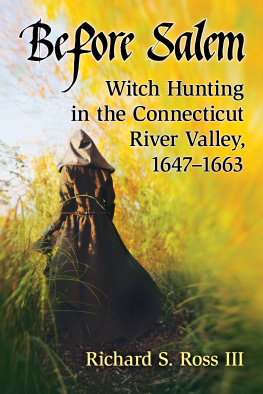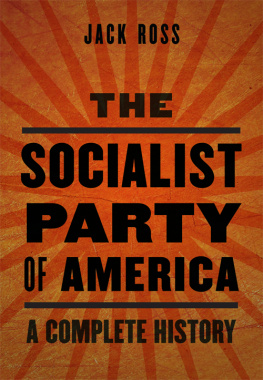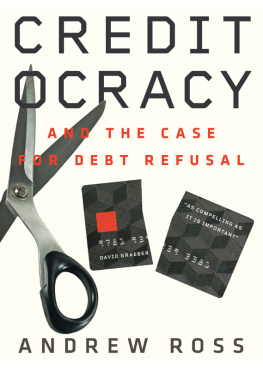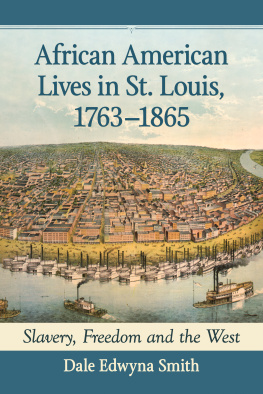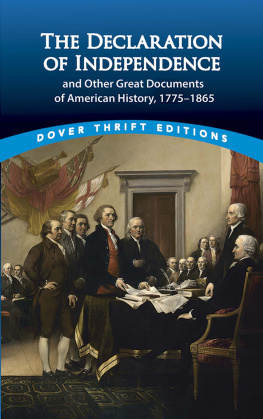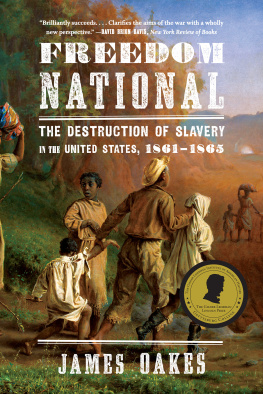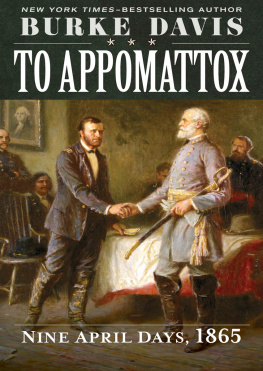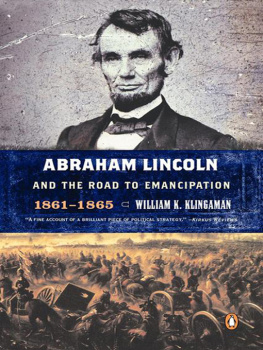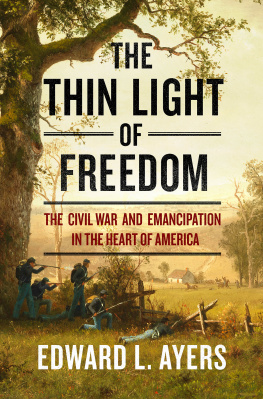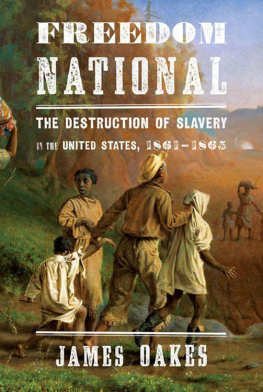We offer to read an annotation, description, summary or preface (depends on what the author of the book "Before Salem" wrote himself). If you haven't found the necessary information about the book — write in the comments, we will try to find it.
I. Before freedom: to 1865 : 1. The promise of American life : The Declaration of Independence, 1776 ; The Constitution of the United States, 1787 -- 2. Defining status: slave and freeman : The slave code of Alabama -- 3. Racial ideology: opinion in the young republic : Thomas Jefferson, 1785 ; Samuel Stanhope Smith, 1787 ; Josiah Priest, 1851 ; George Fitzhugh, 1854 ; Theodore Parker, 1846 ; Abraham Lincoln, 1858 ; Louis Agassiz, 1863 -- 4. The black man in the courts: inequality affirmed : Robert v. city of Boston, 1849 ; Dred Scott v. Sandford, 1857 -- 5. The civil war: end of chattel slavery : The emancipation proclamation, 1863 ; The Thirteenth Amendment, 1865 ; First Freedmens Bureau Act, 1865 -- II. The first shock of freedom: 1865-1883 : 1. Racial ideology: Anglo-Saxon master-racism : Josiah Strong, 1882 -- 2. Views from the White House : Andrew Johnson, 1865 ; Ulysses S. Grant, 1869, 1873 ; Rutherford B. Hayes, 1877 ; James A. Garfield, 1881 ; Chester A. Arthur, 1881 -- 3. The national party platforms : Campaign of 1868 ; Campaign of 1872 ; Campaign of 1876 ; Campaign of 1880 -- 4. Status of the ex-slave: the Black Codes : The Mississippi black code, 1865 -- 5. The crop lien system : The Mississippi crop lien law, 1867 --6. The birth of Jim Crow : Railway segregation act, Florida, 1865 ; Railway segregation act, Mississippi, 1865 -- 7. Control of reconstruction by congress : The beginning of federal civil rights legislation : The Civil Rights Act of 1866. The reconstruction acts : First reconstruction act, 1867. The Fourteenth and Fifteenth amendments, 1868,1870 ; The force acts : First enforcement act, 1870 ; Enforcement (Ku Klux) Act, 1871. The Civil Rights Act of 1875 -- 8. Defying the Fifteenth Amendment -- 9. The Supreme Court and the Negro, 1865-1883 : Devitalizing the Fourteenth and Fifteenth amendments : The slaughterhouse cases, 1873 ; United States v. Reese, 1876 ; United States v. Cruikshank, 1876 ; Hall v. De Cuir, 1878. The Fourteenth amendment and jury service : Strauder v. West Virginia, 1880 ; Ex parte Virginia, 1880 ; Virginia v. Rives, 1880. The franchise, the Civil Rights Act, and the Constitution : Ex parte Siebold, 1880. Unequal punishment and the Fourteenth Amendment : Pace v. Alabama, 1882. The Supreme Court and the Ku Klux Act : United States v. Harris, 1883. The Supreme Court stops federal protection of civil rights : The civil rights cases, 1883 -- 10. State laws to protect civil rights : Louisiana, 1869 ; Florida, 1873 ; North Carolina, 1876 ; New York, 1873 -- 11. Discrimination by state law : Anti-civil rights legislation : Delaware, 1873, 1875. Marriage and other rights of ex-slaves : An act concerning negroes and persons of mixed blood, North Carolina, 1865. Laws prohibiting mixed marriages : Constitution and revised code of Alabama, 1865-1867 ; Florida, 1832 ; Arizona, 1865 ; California, 1852. Definitions of Negro : Georgia, 1865 ; Tennessee, 1865. Unequal punishment for blacks : Kentucky, 1867 ; Florida, 1866 ; Kentucky, 1869. Exclusion for jury service : West Virginia, 1872. Separate schools by legislation : Alabama, 1875 ; Georgia, 1877 ; Mississippi, 1878. The first permanent Jim Crow laws: Tennessee : Permissive act, Tennessee, 1875 ; Mandatory act, Tennessee, 1881 -- 12. Civil rights and the state courts, 1865-1883 : Prohibition of intermarriage : Green v. state, 1871 ; State v. Gibson, 1871 ; Frasher v. State, 1877 ; Francois v. State, 1880. Public transportation: segregation affirmed : West Chester and Philadelphia Railroad Co. v. Miles, 1867 ; De Cuir v. Benson, 1875. Segregated schools sustained : Ward v. Flood, 1874 ; People v. Gallagher, 1883. Vocational exclusions approved : In re Taylor, 1877. Definitions of the Negro appraised : People v. Dean, 1866 ; Monroe v. Collins, 1867. Unequal punishment for blacks upheld : Ellis v. State, 1868 ; Ford v. State, 1875 ; Pace and Cox v. state, 1881 -- III. Fading Hopes, 1883-1910 : 1. Racial ideology: turn-of-the-century views : Some southern demagogues: James K. Vardman, Ben Tillman, and Tom Watson, ca. 1910 ; Charles Carroll, 1900 ; A reply to Charles Carrol, 1903 ; William Benjamin Smith, 1905 ; Frederick L. Hoffman, 1891 ; G. Stanley Hall, 1905 ; Franz Boas, 1894 ; Booker T. Washington, 1895 ; W. E. B. DuBois, 1903 ; The Niagara Movements declaration of principles, 1906 -- 2. Views from the White House : Grover Cleveland, 1885 ; Benjamin Harrison, 1889 ; William McKinley, 1897 ; Theodore Roosevelt, 1905 ; William Howard Taft, 1908 -- 3. The national party platforms, 1884-1908 : Campaign of 1884 ; Campaign of 1888 ; Campaign of 1892 ; Campaign of 1896 ; Campaign of 1900 ; Campaign of 1904 ; Campaign of 1908 -- 4. State laws to protect civil rights : Tennessee, 1885 ; Arkansas, 1909 ; Kentucky, 1906 ; Michigan, 1885 ; New Jersey, 1898 ; Massachusetts, 1896 ; Indiana, 1899 -- 5. Discrimination by state law : Reinforcing the ban on racial intermarriage : Florida, 1885 ; Alabama, 1901 ; Montana, 1909. Defining the Negro : Oklahoma, 1907 ; Arkansas, 1891, 1911. Prescribing segregation in public conveyances : Louisiana, 1890 ; Louisiana, 1894 ; Georgia, 1899 ; North Carolina, 1907. Miscellaneous provisions for separate facilities : Florida, 1885 ; Kentucky, 1891 ; Alabama, 1901 ; Kentucky, 1904 ; Florida, 1903 ; Arkansas, 1903. Restricting the franchise : Mississippi, 1890 ; A grandfather clause, Louisiana, 1898 ; Disfranchisement and the Virginia constitutional convention, 1901-1902 -- 6. The Supreme Court and the black American, 1883-1910 : Preserving the restricted franchise : Ex parte Yarbrough, 1884 ; James v. Bowman, 1903 ; William v. Mississippi, 1897. Separate-but-equal upheld: public conveyances : Louisville, New Orleans, and Texas railway v. Mississippi, 1897 ; Plessy v. Ferguson, 1896. Separate schools approved : Berea college v. Kentucky, 1908 ; Cumming v. county board of education, 1899. Jury service and equal protection : Carter v. Texas, 1899. Peonage outlawed : Bailey v. Alabama, 1910 -- 7. The state courts and civil rights, 1883-1910 : Separate schools sustained : Berea College v. Commonwealth, 1906 ; Williams v. Board of Education of the City of Parsons, 1908 ; Puitt v. Gaston Country, 1886. Public conveyances: Jim Crow defended : Ex parte Plessy, 1892 ; Patterson v. Taylor, 1906. Public accommodations: inequality overruled : Ferguson v. Gies, 1890 ; Baylies v. Curry, 1899 ; Rhone v. Loomis, 1898 ; In re Russs application, 1898. Jury service: equal protection in doubt : Tarrance v. Florida, 1901 ; State v. Peoples, 1902 -- IV. Hopes deferred: the color line holds: 1910-1938 : 1. Racial ideology: some early twentieth-century attitudes : Henry Fairfield Osborn, 1924 ; Madison Grant, 1916, 1933 ; Henry Pratt Fairchild, 1926 ; Lothrop Stoddard, 1923 ; Franz Boas, 1911 ; Thomas R. Garth, 1931 ; Otto Klineberg, 1935 ; The national urban league, 1923 ; The national association for the advancement of colored people, 1910 -- 2. Views from the White House : Woodrow Wilson, 1913 ; Warren G. Harding, 1921 ; Calvin Coolidge, 1921 ; Herbert Hoover, 1932 ; Franklin D. Roosevelt, 1933 -- 3. The national party platforms : Campaigns of 1912, 1916, and 1920 ; Campaign of 1924 ; Campaign of 1928 ; Campaign of 1932 ; Campaign of 1936 -- 4. State laws to protect civil rights : Anti-defamation laws : California, 1925 ; Illinois, 1917, 1919. Laws against violence and lynching : Kentucky, 1920 ; Louisiana, 1924. A law to prohibit segregated schools : Pennsylvania, 1911. Fair employment laws : New York, 1918 ; Illinois, 1933. A comprehensive and civil rights law : New York, 1913 -- 5. Discrimination by state law : Restricting the franchise: the white primary : Texas, 1923 ; Texas, 1927. School segregation laws : Arizona, 1927. Miscellaneous Jim Crow laws : Kentucky, 1928 ; Arkansas, 1909, 1913, 1919 ; Georgia, 1925 ; Alabama, 1911, 1915 ; Oklahoma, 1931 ; Louisiana, 1914 ; Mississippi, 1920. Residential segregation prescribed : Virginia, 1912 -- 6. The federal courts and the black American, 1910-1938 : Separate-but-equal reaffirmed : McCabe v. Atchison, Topeka, and Santa Fe railway company, 1914. Residential segregation: cracking the ghettos walls : Buchanan v. Warley, 1917 ; Corrifan v. Buckley, 1926 ; Richmond v. Deans, 1927. Fair trials: new gains : Moore v. Dempsey, 1923 ; Aldridge v. United States, 1931 ; Powell v. Alabama, 1932 ; Norris v. Alabama, 1935 ; Brown v. Mississippi, 1936. Separate schools sustained ; The franchise: the struggle continues : Guinn v. United States, 1915 ; Nixon v. Herndon, 1927 ; Nixon v. Condon, 1932 ; Grovey v. Townsend, 1935 ; Trudeau v. Barnes, 1933 -- 7. Civil rights and the state courts, 1910-1938 : Segregated education: increasing ambivalence : University of Maryland v. Murray, 1935 ; Williams v. Bradford, 1911 ; Tucker v. Blease, 1914 ; Wright v. Board of Education of Topeka, 1929. Residential segregation: affirmed and denied : Buchanan v. Warley, 1915 ; Harris v. City of Louisville, 1915 ; Harden v.City of Atlanata, 1917 ; Jackson v. State, 1918 ; Tyler v. Harmon, 1925 ; Parmalee v. Morris, 1922 ; Wyatt v. Adair, 1927. Public facilities: limited progress toward equality : Guy v. Tri-state Amusement Company, 1918 ; Holden v. Grand Rapids Operating Company, 1927. Segregated transportation on the defensive : Illinois Central Railway Company v. Redmond, 1919. Juries and fair trial: increasing surveillance : Washington v. State, 1928 ; Carrick v. State, 1929. The franchise: the white primary approved : White v. Lubbock, 1930 -- V. Reviving hopes: 1938-1954 : 1. Racial ideology: equalitarianism and dissent : Gunnar Myrdal, 1944 ; John Gillin, 1948 ; Marion Krogman, 1945 ; Ruth Benedict and Gene Weltfish, 1943 ; Theodore Bilbo, 1947 -- 2. Views from the White House : Franklin D. Roosevelt, 1941, 1944 ; Harry S, Truman, 1947 -- 3. The national party platforms : Campaign of 1940 ; Campaign of 1944 ; Campaign of 1948 ; Campaign of 1952 -- 4. State civil rights legislation : Outlawing school segregation : Indiana, 1949. Forbidding the spread of racial hatred : Indiana, 1947. A fair employment practices law : Connecticut, 1943. A fair educational practice law : New York, 1948. Discrimination outlawed in public housing : Massachusetts, 1946. A general civil rights law : New York, 1945. An anti-defamation statue in the South : Florida, 1945 -- 5. Discrimination by state law : The reach of discriminatory legislation ; The franchise: new constraints : Boswell amendment, 1945 ; Georgia, 1949. Segregated transportation reaffirmed : Alabama, 1945. Segregated cemeteries preserved : North Carolina, 1947. The southern regional education program -- 6. The federal courts and the black American, 1938 - 1954 : The franchise: toward compliance with the constitution : Lane v. Wilson, 1939 ; Smith v. Allwright, 1944 ; Rice v. Elmore, 1947 ; Brown v. Baskin, 1948 ; Davis v. Schnell, 1949 ; Terry v. Adams, 1953. Segregated education: the beginning of the end : Missouri ex rel Gaines v. Canada, 1938 ; Sipuel v. Board of Regents of the University of Oklahoma, 1948 ; Sweatt v. Painter, 1950 ; McLaurin v. Oklahoma state regents, 1950 ; Brown v. Board of Education of Topeka, 1954 ; Mills v. Board of Education of Anne Arundel County, 1939. Segregated housing and restrictive covenants : Favors v. Randall, 1941 ; Shelley v. Kraemer, 1948 ; Barrows v. Jackson, 1953. Segregated transportation: the collapse of legal Jim Crow : Mitchell v. United States, 1941 ; Morgan v. Virginia, 1945 ; Whiteside v. southern bus lines, 1949 ; Henderson v. United States interstate commerce commission and southern railway. Fair trials: qualified goods : Smith v. Texas, 1940 ; Chambers v. Florida, 1940 ; Screws v. United States, 1945. Public accommodations: approaching equal treatment : Sweeney v. city of Louisiana, 1951 ; Muir v. Louisville park theatrical association, 1953 ; District of Columbia v. John R. Thompson company, 1953 -- 7. The state courts and civil rights, 1938-1954 : Higher education: gains for equal protection : McCready v. Byrd, 1950 ; Parker v. University of Delaware, 1950. Miscegenation: challenging the ban : Perez v. Lippold, 1948. Segregated transportation sustained : Commonwealth v. Carolina coach company of Virginia, 1951. Residential segregation approved : Kraemer v. Shelley ; Sipes v. McGhee, 1946 ; Clinard v. City of Winston-Salem, 1940. Fair trials : State v. Logan, 1937 -- 8. Federal executive action promoting civil rights, 1937-1954 : Executive order 8802, 1941 ; Executive order 9809, 1946 ; Presidents committee on civil rights, 1947 ; Executive order 9981, 1948 -- VI. Progress, stalemate, or reaction? 1954-1970 : 1. Racial ideology: conservatives, moderates, and militants : The white citizens councils of America, 1965 ; Paul Bohannon, 1963 ; The churches, 1963 ; The report of the national advisory committee on civil disorders, 1968 ; Harry Golden, 1956 ; Martin Luther King, Jr., 1958, 1963 ; The National Association for the Advancement of Colored People, 1967, 1968 ; Whitney Young, 1964 ; James Farmer, 1965 ; Elijah Muhammad, 1965 ; Malcolm X, ca. 1966 ; Le Roi Jones, 1966 ; Stokely Carmichael, 1966 ; The conference on black power, 1967 ; Eldridge Cleaver, 1968 ; The black manifesto 1969 -- 2. Views from the White House : Dwight D. Eisenhower, 1959 ; John F. Kennedy, 1963 ; Lyndon B. Johnson, 1965 ; Richard M. Nixon, 1969 -- 3. The national party platforms, 1956-1968 : Campaign of 1956 ; Campaign of 1960 ; Campaign of 1964 ; Campaign of 1968 -- 4. State laws to protect civil rights : Anti-segregation statutes and ordinances : Massachusetts, 1965 ; Southern cities, 1956-1963. Fair employment laws : Illinois, 1961. Fair housing enactments ; Public accommodations statutes : Vermont, 1957. General civil rights laws : Kentucky, 1966. Miscellaneous rights statutes : Miscegenation and intermarriage, 1959-1967 ; Hospitals, Chicago, 1956 ; Instruction in negro history, California, 1965 -- 5. State discriminatory laws: reaction to the Brown decision : Miscellaneous discriminatory statures : Blood banks: Louisiana, 1958 ; Beaches: Florida, 1957 ; Eating and sanitary facilities: Louisiana, 1956 ; Entertainment: Louisiana, 1956 ; Sports and games: Virginia, 1956, Alabama, 1957 ; Use of a municipal golf course: Alabama, 1956 ; Sale of public facilities: Georgia, 1956 ; Public parks and recreation centers: Louisiana, 1956 ; Selecting business clientele: Mississippi, 1956 ; State parks: South Carolina, 1956 ; Housing, California, 1964. The franchise and elections: renewed discrimination : Louisiana, 1960 ; Georgia, 1958. State legislation to thwart school desegregation: Nullification and interposition : Alabama, 1956 ; South Carolina, 1956, 1957, Virginia, 1956, Arkansas, 1956, the southern manifesto, 1956 ; Anti-barratry laws : South Carolina, 1957 ; Arkansas, 1957 ; Anti-NAACP laws : Arkansas, 1959 ; School closing laws: North Carolina, 1956, Louisiana, 1958 ; Diverting funds to private schools: Virginia, 1956 ; Laws to end compulsory school attendance: Virginia, 1959, North Carolina, 1956 ; Encouraging teachers to shift to private schools: Georgia, 1957 ; Scholarships for private school students: Virginia, 1960 ; Cutoff of state funds from integrated schools: South Carolina, 1955, Virginia, 1956 ; Re-enacting segregation provisions: Louisiana, 1954, Georgia, 1956 ; Denying funds to inefficient schools: Virginia, 1956 ; Pupil assignment laws: North Carolina, 1955, 1956 ; Pupil assignment and freedom-of-choice: Florida, 1965 ; Laws to obstruct Title VI guidelines ; City ordinance to forestall public library desegregation: Danville, Virginia, 1960 -- 6. Executive and legislative action: the federal government resumes the initiative : Executive orders : Executive order 10925, 1961 ; Executive order 11063, 1962 ; Executive order 11114, 1963. Great society measures ; Administrative action: anti-bias order, 1968 ; Federal civil rights laws, 1957-1968 : Civil rights act, 1957 ; Civil rights act, 1960 ; Civil rights act, 1964 ; Compliance regulations ; Public schools and Title VI ; Twenty-fourth amendment, 1964 ; Voting rights act, 1965 ; Civil rights act, 1968 -- 7. The federal courts and the black American, 1954-1970 : Segregated education: the public schools : Brown v. Board of Education, 1955 ; Briggs v. Elliott, 1955 ; Frasier v. Board of Trustees of the University of North Carolina, 1955 ; Cooper v. Aaron, 1958 ; Carson v. McDowell county, 1955 ; School board of Charlottesville v. Allen, 1956 ; Brunson v. Board of Trustees of Clarendon County, 1962 ; Watson v. City of Memphis, 1963 ; Kelley v. Board of Education of Nashville, 1956 ; Shuttlesworth v. Birmingham Board of Education, 1956 ; Norwood v. Tucker, 1961 ; Kelley v. Board of Education of Nashville, 1958 ; Evans v. Ennis, 1960 ; Lockett v. Board of Education of Muscogee County, 1964 ; James v. Almond, 1959 ; Hall v. St. Helena parish, 1961 ; Allen v. Prince Edward county, 1961 ; Griffin v. Prince Edward county, 1964 ; Braxton v. Duval county, 1962 ; Rackley v. Orangeburg County, 1966 ; Taylor v. Board of Education of New Rochelle, 1961 ; Bell v. School City of Gary, 1963 ; Hobson v. Hansen, 1967 ; Responses to the Civil Rights Act of 1964 ; Goss v. Board of Education of Knoxville, 1963 ; Bush v. Orleans Parish School Board, 1962 ; Freedom-of-choice and revised guidelines, 1967-1969 ; Court ordered plans, 1967 ; United States v. Jefferson County Board of Education, 1966 ; Lee v. Macon County board of education, 1967 ; Allen v. school board of Prince Edward county, 1967 ; Green v. school board of New Kent county, 1968 ; Barksdale v. Springfield school committee, 1965 ; Olsen v. board of education of Malverne, 1966 ; Offerman v. Nitkowski, 1967 ; United States v. school districts of Cook county, 1968 ; Anthony v. Marshall county board of education, 1969 ; United States v. Montgomery county school board, 1969 ; Nixon administration policy statement, 1969 ; Alexander v. Holmes county board of education, 1969 ; Carter v. West Feliciana school board, 1970. Segregated education: colleges and universities : Public institutions of higher learning : Florida ex rel Hawkins v. board of control of Florida, 1954, 1956 ; Lucy v. Adams, 1955 ; End of absolute segregation at university of Georgia, 1961 ; Holmes v. Danner, 1961 ; Meredith v. Fair, 1962 ; Governor Ross Barnetts proclamation, 1962 ; United states v. Wallace, 1963 ; Governor George Wallaces proclamation, 1963 ; The black student movement, 1967-1970 ; Private institutions of higher learning : the Girard college cases, 1967. The franchise: equality in sight : Gomillion v. Lightfoot, 1960 ; United States v. Alabama, 1960 ; Effects of the civil rights act of 1957-1965 ; United States v. ward and state of Louisiana, 1965 ; South Carolina v. Katzenbach, 1966 ; Gaston county v. United States. Public accommodations: toward equal access : Muir v. theatrical park association, 1954 ; Dawson v. mayor and city council of Baltimore, 1955 ; Holmes v. city of Atlanta, 1955 ; Simkins v. city of Greensboro, 1957 ; Tonkins v. city of Greensboro, 1959 ; Derrington v. Plummer, 1956 ; Burton v. Wilmington parking authority, 1961 ; Coke v. city of Atlanta, 1960 ; Evans v. Newton, 1966 ; Simkins v. Moses Cone memorial hospital, 1963 ; The reach of the civil rights act of 1964 ; Heart of Atlanta motel v. United States ; Willis and Kennedy v. Pickrick restaurant, 1964 ; Katzenbach v. McClung, 1964 ; Cuevas v. Sdrales, 1965 ; United States v. Northwest Louisiana restaurant club, 1966 ; Daniel and Kyles v. Paul, 1969 ; Sullivan v. Little Hunting park, 1970. Miscellaneous discriminations and the federal courts : Racial intermarriage: ending the ban : Loving v. Virginia, 1967. Public transportation: the death of Jim Crow : Browder v. Gayle, 1956 ; Bailey v. Patterson, 1962. The assault upon the NAACP : NAACP v. Alabama, 1958-1964. Sit-ins and demonstrations: qualified support : State v. Fox, 1961 ; Edwards v. South Carolina, 1963 ; Peterson v. city of Greenville, 1963 ; Thomas v. state, 1964 ; State v. Davis, 1964 ; Hamm v. Rock Hill; Luper v. Arkansas, 1964 ; Adderley v. Florida, 1966 ; Walker v. city of Birmingham, 1967. Fair trials: narrowing the gap : Ex parte Hamilton, 1963 ; Collins v. Walker, 1964 ; Carter v. jury commission of Green county, 1970 ; Turner v. Fouche, 1970 ; Arnold v. North Carolina, 1964. Housing: levelling the ghettos walls : Reitman v. Mulkey, 1967 ; Jones v. Mayer, 1968. Employment: new gains for equal opportunity : Colorado anti-discrimination commission v. continental airlines, 1963 ; Todd v. joint apprenticeship committee of steel workers of Chicago, 1963 ; Bell v. Georgia dental association, 1964. Epilogue: a parable : Letter to the New York Times Magazine, October 13, 1968.

